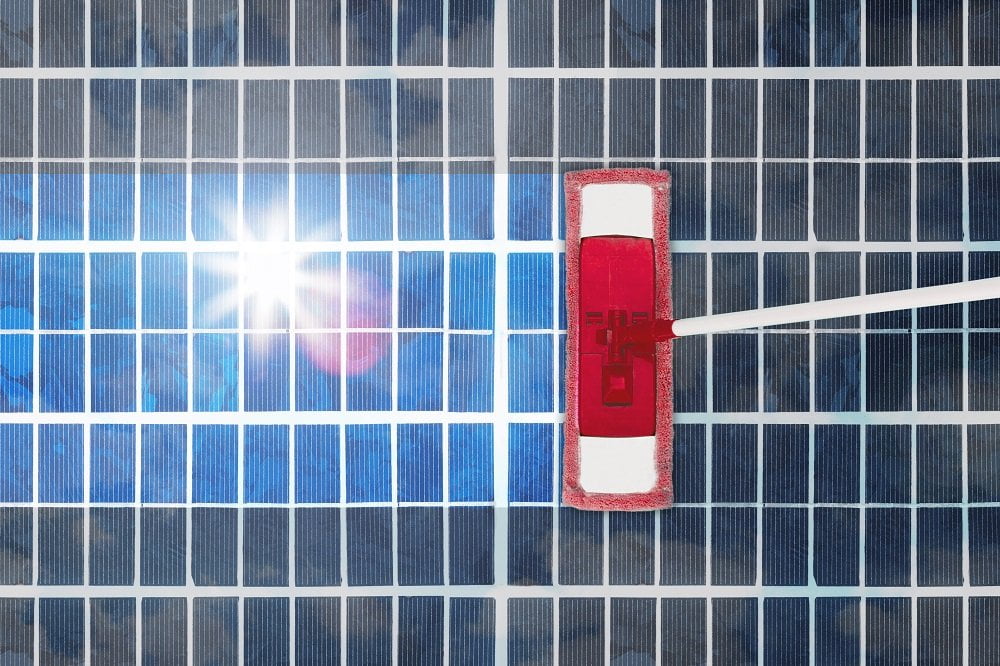Solar panel prevalence is rising, particularly in Brisbane and Queensland, where solar energy is growing more available and economical. Also, the go-green approach many are choosing seems to drive many homeowners to explore cleaner energy options.
Progress in technology has made it achievable for homeowners to not only power their homes with solar energy but deliver it profitable while being soothing on Mother Earth. Solar panels are not a poor man’s fantasy, but what about maintenance? As long as we’ve possessed solar panels, we’ve had the debate over whether or not they should be cleaned.
To clean, or not to clean, that appears like an unusual question, huh? We are a domestic cleaning company, so spoiler alert: we think you should have your panels washed if you want them to work at peak performance at all seasons. Much to our surprise, many manufacturers have declared that their solar panels are “self-cleaning” and consequently save you money, time and energy because they’re so “low-maintenance.”
They actually mean that it should rain enough for your panels to stay clean and productive… enough. With that logic, we could claim that your windows, roof, siding, sidewalk, deck, and driveway are all “self-cleaning,” also. They’re external, so if it rains once in a while… they must be clean, correct?
Solar panel cleaning & maintenance companies like Wishy Washy Windows in Brisbane find themselves having to demonstrate to customers that a dirty solar panel, even of the “self-cleaning” type, just aren’t going to be productive.
Why? A general term used to represent dirty solar panels is “soiling.” Soiling is the accumulation of pollution on solar panels that eventually prevents the sun’s rays, profoundly influencing their efficiency. Dirt, sand and pollen, bird droppings are all kinds of soiling.
Dirt and bird droppings are the most prevalent and energy-zapping of all the solar panel soiling. Once they dry and cake on, no quantity of rain is hurrying them away. YES, in particular areas, soiling is more minor of a problem than in others. But if it’s raining all the time wherever you live, why do you possess solar panels? Is there sufficient sun to really warrant that purchase? I diverge…
I swear we did our research. Soiling is a fact and not a happy one. The honest debate is that the soiling of a panel creates a significant enough loss of conversion to require cleaning. According to Seamus Curran, Director of the Institute for NanoEnergy and Associate professor of physics at the University of Houston,
A dirty solar panel can reduce its power capabilities by up to 30 per cent in high dust/pollen or desert areas.
Source: Society For Science
Professor Curran’s assertion is supported by a couple of studies:
A whitepaper published by Atonometrics sites numerous studies. Still, one in particular provided by the PowerLight Corporation revealed that soiled panels dropped 20% efficiency. Without rainfall, that number skyrockets to up to 0.3% every day. Another study mentioned in the whitepaper declared that they discovered soiling losses at up to 9% a week.
Cyprus University did an impressive study trying to determine the effects of soiling on various types of solar panels. What the study reveals is exactly what other studies have explained; no breaking news here. The reduction of performance from soiling was about 13%. The fascinating part of the study was that this decrease held even after rain.
The study’s determination was that panels need to be cleaned every three weeks through the dry season. If there is a dust storm accompanied by rain, the panels should be clean promptly. The argumentation is simple. Heavy rainfall and lots of dirt equal mud, which clumps, sticks and can not be infiltrated by rain, let alone the sun.
So you are presumably wondering, “how do I clean my solar panels?” The solution is pretty simple! Cleaning solar panels is as straightforward as cleaning a window. The challenge depends solely on the location of your panels, as most solar panels are placed on the roof or on an elevated exterior.
Scaling rooves or using ladders can be hazardous. That is why most professionals utilise a water-fed pole. We’ll have to write another blog article just on the alchemy of water-fed poles. They’re fabulous. Numerous factors can produce problems when cleaning your panels, like hard water or incorrect chemicals.
The result is simple. Solar panels are an investment. They have one mission, and that is to produce you with cheap, efficient energy. In line to get the best outcomes from your solar panels, clean them when it is needed.
Scheduling regular cleanings will guarantee your panels are operating at their peak ability. Wishy Washy offers professional solar system cleaning and maintenance in Brisbane. Every technician is fully trained, insured and has passed a background check. Also, prices, costs and quotes are always free!

